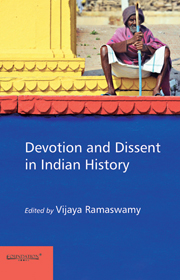Book contents
- Frontmatter
- Dedication
- Contents
- List of Tables and Figures
- Foreword
- Preface
- Introduction: Locating Devotion in Dissent and Dissent in Devotion A Thematic Overview
- Introduction
- 1 Parsing of Devotion and Dissent
- 2 Dissent and Protest in Early Indian Buddhism with Special Reference to Devadatta
- 3 Devotion and Dissent in Hunter's Bhakti
- 4 Devotion and Dissent
- 5 Dissent Within
- 6 Women in Love
- 7 Dissenting Voices
- 8 Dissent in Kabir and the Kabir Panth
- 9 Devotion and Dissent of Punjabi Dalit Sant Poets
- 10 Protest and Counter-protest
- 11 Fakirs of Bengal
- 12 Music in Chishti Sufism
- 13 Dissenting the Dominant
- 14 Devotion and Dissent within the Catholic Church in Late Colonial Bengal
- 15 Narratives of Travel, Voices of Dissent and Attacks on the Colonial Church Fabric of the European Missionaries
- 16 Devotion and Dissent in Narayana Guru
- 17 Sree Narayana Guru's Idioms of the Spiritual and the Worldly
- Contributors
- Index
5 - Dissent Within
from Introduction: Locating Devotion in Dissent and Dissent in Devotion A Thematic Overview
Published online by Cambridge University Press: 05 October 2014
- Frontmatter
- Dedication
- Contents
- List of Tables and Figures
- Foreword
- Preface
- Introduction: Locating Devotion in Dissent and Dissent in Devotion A Thematic Overview
- Introduction
- 1 Parsing of Devotion and Dissent
- 2 Dissent and Protest in Early Indian Buddhism with Special Reference to Devadatta
- 3 Devotion and Dissent in Hunter's Bhakti
- 4 Devotion and Dissent
- 5 Dissent Within
- 6 Women in Love
- 7 Dissenting Voices
- 8 Dissent in Kabir and the Kabir Panth
- 9 Devotion and Dissent of Punjabi Dalit Sant Poets
- 10 Protest and Counter-protest
- 11 Fakirs of Bengal
- 12 Music in Chishti Sufism
- 13 Dissenting the Dominant
- 14 Devotion and Dissent within the Catholic Church in Late Colonial Bengal
- 15 Narratives of Travel, Voices of Dissent and Attacks on the Colonial Church Fabric of the European Missionaries
- 16 Devotion and Dissent in Narayana Guru
- 17 Sree Narayana Guru's Idioms of the Spiritual and the Worldly
- Contributors
- Index
Summary
Introduction
The Bhakti movement in South India initially emerged as a dissent tradition against the orthodox Vedic Brahmanism and stood for social equality. But at a certain point in time, bhakti becamean ideological instrument in the hands of ruling elites and justified social inequalities. For the sake of its survival, the radical flavour of the Bhakti movement gradually receded to the background and the movement came to depend upon the patronage of ruling elites. The essay explores how the cittar or siddha tradition, which nurtured radical views against social injustice, came to fill the vacuum created by the degenerate Bhakti movement and of how such voices dissent eventually gave birth to an alternative value system and a new mode of devotion. It is argued that the cittar tradition cannot be studied alone as a theological response to bhakti but there is a need to understand how it represented the overall contemporary discontent of the common man against the socio-political institutions created by the bhakti ideology. Hence, the essay also studies epigraphic references to people's resistances against socio-political institutions and thus looks at their relevance to the dissents in cittar literatures.
Bhakti and Ideological Subjugation
The picture of society indicated in the early Tamil literatures shows us that kin relations and the ideology of heroism defined the early social formation. But the dominant scenarios of early social formation withered away by the beginning of the first millennium AD. The characteristics and practices of early social formation, such as predatory politics, cattle raids and warfare, sharing food with commoners and even kinship bonds in production, had lost their grip. Conversely, a new social formation, structured by the ethos of plough agriculture, began to develop. As production activity was modelled more on the agrarian economy, values and institutions of the agrarian social relations were produced and reproduced. This led to the growth of composite social relations in which the state and religion were integral.
- Type
- Chapter
- Information
- Devotion and Dissent in Indian History , pp. 98 - 121Publisher: Foundation BooksPrint publication year: 2014



